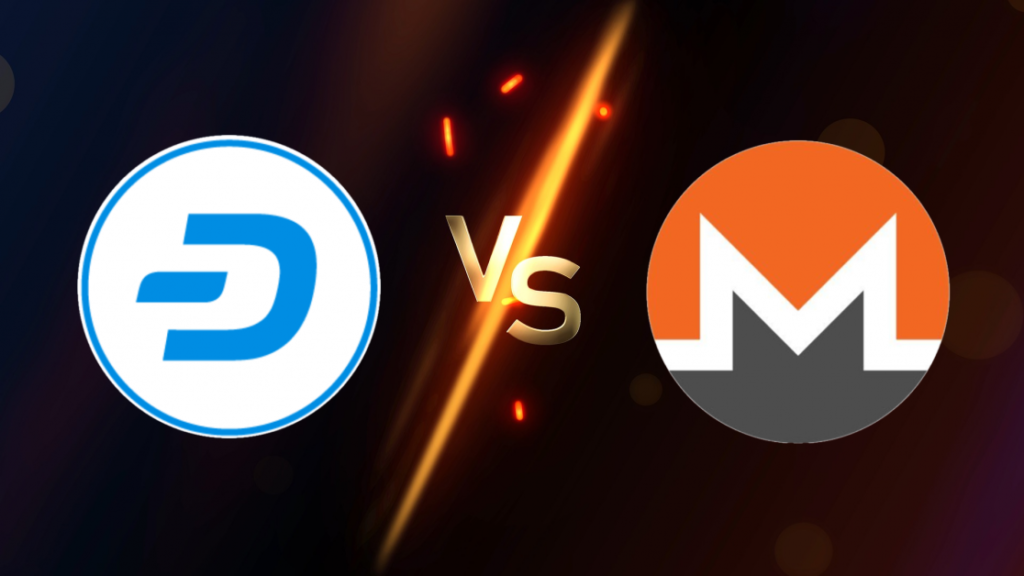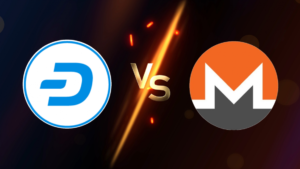Monero vs Dash: Overview

Cryptocurrency has been a buzzword for the past few years, with numerous digital assets making their way into the market. Two such popular cryptocurrencies are Monero and Dash. Monero, a privacy-focused cryptocurrency, was launched in 2014 and has been making waves in the crypto world for its emphasis on privacy and security. Dash, on the other hand, is a decentralized autonomous organization (DAO) that was launched in 2014 and aims to provide faster and cheaper transactions compared to traditional cryptocurrencies like Bitcoin.
The purpose of this article is to compare Monero and Dash as cryptocurrencies. This article will provide a comprehensive overview of the key features, use cases, and differences between Monero and Dash. Whether you are a seasoned crypto investor or new to the world of cryptocurrency, this article will give you a clear understanding of the two cryptocurrencies and help you make an informed decision.
Background of Monero
Monero, also known as XMR, was launched in April 2014 as a fork of the Bytecoin cryptocurrency. It was created with the primary goal of providing a privacy-focused alternative to other cryptocurrencies like Bitcoin, which had a relatively transparent ledger. Monero is an open-source project and has a strong community of developers who are constantly working to improve the technology.
Key features of Monero
- Privacy: Monero uses several privacy-enhancing technologies such as ring signatures, stealth addresses, and confidential transactions to provide a high level of privacy for its users.
- Decentralization: Monero operates on a decentralized network, meaning that there is no central authority controlling the currency.
- Fungibility: Monero is fungible, meaning that each unit of the currency is interchangeable and has the same value. This is because Monero’s privacy features make it difficult to track the origin of a particular unit of the currency, thus making it more appealing to users who value privacy.
Pros:
- Strong privacy: Monero’s privacy features make it a popular choice for users who value privacy.
- Decentralized: Monero operates on a decentralized network, which makes it resistant to censorship and control by a single entity.
- Fungibility: Monero’s fungibility makes it a more attractive option for users compared to other cryptocurrencies that have a transparent ledger.
Cons:
- Scalability: Monero’s privacy-enhancing technologies can make the network slow, leading to scalability issues.
- Adoption: Monero’s privacy features may not be appealing to everyone, leading to lower adoption compared to other cryptocurrencies.
- Regulation: Monero’s emphasis on privacy has led to concerns about its use in illegal activities, leading to potential regulatory challenges in the future.
Background of Dash
Dash, which stands for Digital Cash, was created in January 2014 as a fork of the Bitcoin blockchain. Initially named Xcoin and later changed to Darkcoin, it was finally rebranded to Dash in 2015. Dash was created with the goal of providing faster and cheaper transactions compared to Bitcoin.
Key features of Dash
- Speed: Dash boasts of fast transaction times and can process up to 56 transactions per second.
- Decentralized Autonomous Organization (DAO): Dash operates as a DAO, meaning that it is run by a decentralized network of master nodes, which are responsible for performing important functions like instant send, governance, and budgeting.
- Low transaction fees: Dash has low transaction fees, making it an attractive option for users who want to avoid high fees.
Pros
- Speed: Dash’s fast transaction times make it a popular choice for users who need to make transactions quickly.
- DAO: Dash’s decentralized autonomous organization (DAO) structure provides a high degree of decentralization and reduces the influence of any single entity.
- Low transaction fees: Dash’s low transaction fees make it an attractive option for users who want to avoid high fees.
Cons
- Scalability: Dash’s scalability has been a concern, with some experts raising doubts about its ability to handle a large number of transactions.
- Adoption: Dash’s adoption has been relatively slow compared to other cryptocurrencies, which may limit its growth potential.
- Centralization: Despite its DAO structure, some experts argue that Dash’s governance structure is highly centralized and may be susceptible to corruption.
Comparison between Monero and Dash
Similarities between Monero and Dash
- Both Monero and Dash are decentralized cryptocurrencies, meaning that they operate on a decentralized network and are not controlled by a single entity.
- Both Monero and Dash aim to provide a digital alternative to traditional fiat currencies.
Differences between Monero and Dash
- Privacy: Monero places a strong emphasis on privacy, using technologies like ring signatures, stealth addresses, and confidential transactions to protect its users’ information. Dash, on the other hand, has a more transparent ledger and does not place as much emphasis on privacy.
- Governance Structure: Monero operates on a decentralized network, with no central authority controlling the currency. Dash operates as a DAO, meaning that it is run by a decentralized network of masternodes.
- Transaction speed: Dash is designed to provide faster transaction times compared to Monero, which can make it a better option for users who need to make transactions quickly.
In terms of privacy and security, Monero has a strong emphasis on privacy, making it a popular choice for users who value privacy. Dash, on the other hand, has a more transparent ledger and does not place as much emphasis on privacy, which may make it less appealing to users who value privacy.
Dash is designed to provide faster transaction times compared to Monero, which can make it a better option for users who need to make transactions quickly. In terms of transaction fees, Dash has lower transaction fees compared to Monero, which may make it a more attractive option for users who want to avoid high fees.
In terms of adoption and popularity, Monero has been relatively successful, with a strong community of users and developers. Dash has also been successful, but its adoption has been slower compared to other cryptocurrencies. Both Monero and Dash have their own unique features and strengths, and their success and popularity will likely depend on a variety of factors, including their ability to attract users, provide a useful and valuable service, and evolve to meet the needs of the market.
Use cases
Cryptocurrencies like Monero and Dash have many different use cases and applications, which can vary depending on factors such as the needs of the user, the features of the currency, and the state of the market.
Monero use cases
- Privacy: Monero’s strong emphasis on privacy makes it an attractive option for users who value privacy and want to keep their financial transactions private.
- Online commerce: Monero can be used as a means of payment for online goods and services, providing a fast and secure way to make transactions.
- Remittances: Monero can be used to send money across borders, making it a useful tool for remittances.
Dash use cases
- Fast Transactions: Dash’s fast transaction times make it a popular choice for users who need to make transactions quickly.
- Decentralized Autonomous Organization (DAO): Dash’s DAO structure makes it an attractive option for users who want to participate in decentralized governance and decision-making.
- Low transaction fees: Dash’s low transaction fees make it an attractive option for users who want to avoid high fees.
Both Monero and Dash have their own unique use cases and strengths, and their success and popularity will likely depend on a variety of factors, including their ability to attract users, provide a useful and valuable service, and evolve to meet the needs of the market.
Monero vs Dash: Conclusion
Monero and Dash are both decentralized cryptocurrencies that aim to provide a digital alternative to traditional fiat currencies. They both have their own unique strengths and weaknesses, and their success and popularity will likely depend on a variety of factors, including their ability to attract users, provide a useful and valuable service, and evolve to meet the needs of the market.
In terms of privacy, Monero places a strong emphasis on privacy, while Dash has a more transparent ledger. In terms of speed, Dash is designed to provide faster transaction times, while Monero is designed for privacy. In terms of transaction fees, Dash has lower fees compared to Monero.
In conclusion, Monero and Dash are both unique cryptocurrencies with their own strengths and weaknesses. Which one is better for you will depend on your specific needs and priorities. If privacy is your main concern, then Monero may be the better option for you. If fast transactions are more important to you, then Dash may be the better choice. It is important to do your own research and carefully consider your options before investing in any cryptocurrency.




